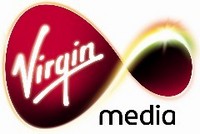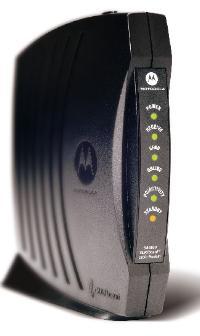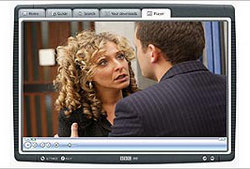Category: Broadband
Opinion: Free laptop deal looks good
 Jonathan Weinberg writes…
Jonathan Weinberg writes…
Let’s face it, who among us is ever going to turn down a free gift – especially when it’s worth up to £500. Well, that’s the prospect facing techno shoppers at Carphone Warehouse, Currys and PC World this week.
You couldn’t have failed to see the ads in the newspapers over the weekend proclaiming the gratis machines in return for signing up to broadband with the likes of Orange and AOL. ‘So where’s the catch?’ I hear you ask. ‘There’s always a catch!’
Well, you’re right, to get the free laptop you are tied into a contract with the firms for two years and yes, the machines aren’t super-spec’d enough to suit most Tech Digest readers. But in terms of getting people interested in technology and onto the interweb superhighway, it has to be good news…
BT considering 50Mbps broadband
 According to a report in the Financial Times, BT’s chairman, Sir Christopher Bland, has said that the company were looking at increasing broadband speeds to between 40 and 50Mbps.
According to a report in the Financial Times, BT’s chairman, Sir Christopher Bland, has said that the company were looking at increasing broadband speeds to between 40 and 50Mbps.
Such a scheme could cost around £4 billion, and thanks to regulation and the high cost, BT would have to make a viable case for implementing it.
FTTC (Fibre To The Cabinet) and VDSL2 are great technology, but in a market where customers want to pay as little as possible for their broadband, BT would need to prove it could recoup the massive cost of development more quickly through value added services such as video on demand.
Virgin Media to offer streaming Football League matches via broadband and mobile
 Virgin Media has announced that it has struck a deal with the Football League to stream match action via broadband and mobile to its customers.
Virgin Media has announced that it has struck a deal with the Football League to stream match action via broadband and mobile to its customers.
It seems as if selected matches will be streamed live, while highlights will be available for a week after the transmission. The service will start ahead of the Coca Cola Championship.
Tiscali adds Sky's channels to its Tiscali TV offering
 Tiscali TV has been around since March and now it’s expanding its offering, with the company signing a deal with BSkyB to offer the full set of Sky basic channels – including Sky One, Sky Two, Sky Three, Sky Arts, Sky Travel, Sky News and Sky Sports News. Sky Movies and Sky Sports channels are already available via the Tiscali TV platform.
Tiscali TV has been around since March and now it’s expanding its offering, with the company signing a deal with BSkyB to offer the full set of Sky basic channels – including Sky One, Sky Two, Sky Three, Sky Arts, Sky Travel, Sky News and Sky Sports News. Sky Movies and Sky Sports channels are already available via the Tiscali TV platform.
High-value consumers want Net Neutrality: no two-tier Internet
 Tim Berners-Lee has spoken out against it, now new research suggests that high-value Internet consumers in Europe want flat-rate pricing on their broadband service without Internet Service Providers (ISPs) placing restrictions on what they can access.
Tim Berners-Lee has spoken out against it, now new research suggests that high-value Internet consumers in Europe want flat-rate pricing on their broadband service without Internet Service Providers (ISPs) placing restrictions on what they can access.
JupiterResearch, which carried out the Europe-wide study, is urging ISPs not to supply faster, prioritised Internet access only to a select group of web sites that pay for improved performance.
29% of consumers questioned said that they desired flat-rate, unlimited broadband, while 16% said they wanted no access restrictions.






















